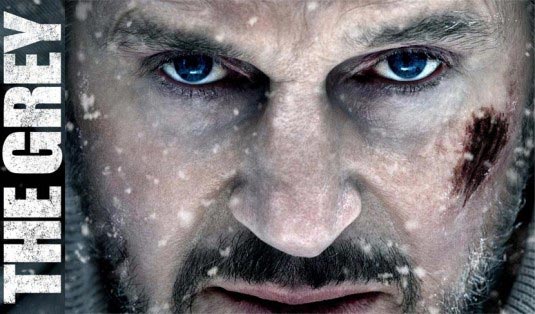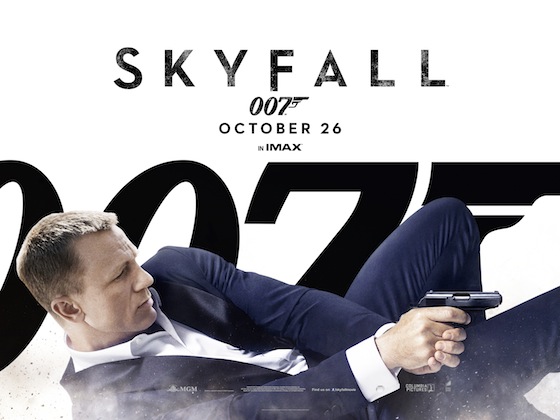Last updated on November 25, 2012
Welcome to Monday Update, where I tend to prattle on about subjects that may or may not interest you in any way.
The Grey – Is this, like, Liam Neeson’s thing now? Violent movies with death and killing, either by his hand or someone/something else?
Fundamentally, The Grey fits within two different types of movies: the slow, tension-building “who’s going to die next” thriller, and the “existential musings on fate, death, and nihilism” that arrives from a more recent dramatic indie-film style format. Director Joe Carnahan does an effective job dealing with the odd logistics in the former kind of narrative. However, the latter just doesn’t work in this kind of film as well as you’d like.
There’s always the audience expectations first – they know that lots of people will die, and die horribly. You need to establish characters without giving them too much character (because we aren’t supposed to care too much about whether they die). If you care too much, then you turn the audience away; too little, and the characters become mere disposables, with a ho-hum reaction from the viewer. It’s similar to a police procedural, only violence usurps the gathering of evidence. Secondly, the MAIN CHARACTER (who, from the screenshot above, should be rather obvious) needs to develop and grow, but not so much that the movie slows down solely for the purpose of exposition. Thirdly, the stakes must be clear and dire, without (again) slowing the movie down for some plodding dialogue.
Does it succeed? Well, not quite. It starts promising enough, but there’s simply too much musing at points. As well, the characters act stupidly and idioticly – that’s a problem with all movies of this type, but I ALWAYS notice it. Character with glasses loses glasses; character who’s overconfident does stupid thing. Seriously, if I was ever in such a situation, you’d do your best to do exactly the opposite of your inclinations in society. It’s survival, stupid.
Seriously, when you establish to the audience that wolves have a certain kill radius from your den, why would you move out from your current location any farther? I understand the need for firewood and the like, but that’s not the intention of the characters. Plus, why are the wolves so aggressive? Aren’t they scavengers? Do they work that cooperatively? Well, good to know that real wolves will never perform the daring feats that they do in The Grey. Still, the movie does make the rules of the game convincing, even if it couldn’t happen in real life.
Furthermore, the nihilistic approach of the film doesn’t add up to anything. We get the familiar “cursing God” scene, apparently waiting for divine intervention. We also get the musings about the afterlife, and does it surprise you that the answer is “this is all there is”? I found it a little contrived – I mean, who actually talks like this? If the movie’s about accepting death, having CGI wolves attack people out of the darkness might not have been the right stylistic move. The primary culprit, honestly, is the bait and switch the movie pulls. There’s no time to develop a character when he’s violently attacked by wolves, and when you do it feels contrived and awkward. Similarly, the ending REALLY tests the patience of an audience’s expectations in the genre. You can’t leave something ambiguous; we NEED to know what happens!
Would I recommend it? Sure, if only for the masterful sense of tension throughout the film. In that sense, it knows what we’re thinking and piles it on with huge lulls and the like. I just don’t think the two elements match well together because it’s not clear which one is the focus.
Skyfall – For a quick summary: not as good as Casino Royale, but miles ahead of Quantum of Solace. Also, probably Plot Spoilers for those concerned, though they’re relatively minor ones. Still, better safe than sorry.
I imagine the reason for the unbelievable critical reception comes from a number of factors, including the four year Bond hiatus and the awful movie that preceded it. Still, these reasons alone don’t make for an excellent movie; it’s merely a good one with some notable flaws.
Casino Royale benefits greatly from being based on the novel of the same name; it has the character development and the clarity of drive that makes it a thrilling experience. Anyone can understand what’s going on with the entire plot, even if you’ve never played Texas hold’em poker before. The psychology behind player movements, both in and out of the central game, mean it’s like a chess match.
Skyfall, on the other hand, starts with a central premise – what does an old Cold Warrior do in an era of boundless technology? – and stretches that premise as far as it can go. Bond’s an old veteran, a tired dog loyal to king and country; M (as played by Judi Dench in quite an exemplary performance) comes from that same line. Their jobs are on the line when they lose the British equivalent of a NOC list containing the names of all MI6 agents in the field. Who’s behind that plot? A former agent of MI6 whose technological skills are, apparently, beyond reckoning. He acts, thinks, and moves like a terrorist with the world at his fingertips. It’s a scary world out there for those who didn’t grow up with such power or learn it through hard work. The conflict between two entirely different worldviews of espionage, as you might expect, makes for some impressively entertaining film-making.
Sam Mendes does a superb job at creating tension throughout because, unlike most Bond films, we have people we care about who aren’t Bond. It’s a foregone conclusion that 007 won’t die – that’s for certain – but the characters surrounding him usually obtain enough development to hold the film’s emotional sense in check. We care because, far from the usual fate conclusion, events end up very differently than you might expect. Locations shift rapidly, plans unfold in the blink of an eye, and we find ourselves at some very creative venues. It’s a cat and mouse game that works superbly well in the final half of the film.
Unfortunately, the plot’s actually very similar to Goldeneye, even if the story beats come at different times and subtle details have been changed to fit the overall theme of obsolescence (same screenwriter, natch). It’s when we lose the focus noted above on the thematic material that we get lost in all sorts of subplots. The most notable of these is the trip to Shanghai – we meet the femme fatale of the piece. However, in an attempt to prevent her from being “objectified” – that is, being a sexual object of conquest for James Bond like every movie previous seems to portray in some sense – they make her into a sex slave. Then they do just that. Then she gets offed nonchalantly. Honestly, I don’t feel bad about revealing this bit – it’s that facile AND totally irrelevant to the plot. Because they refuse to make Bond into a womanizer of any sort, they can’t figure out what to do with the women – so they kill them. Not exactly a great solution! Both female leads (excluding M) have nearly nothing to do and only exist to look pretty. Their lack of inclusion only makes the objectification worse! At least they had something to do in the early days, and they had PERSONALITY, which surely would have helped here!
Our villain, though showing an interesting mix of Julian Assange (remember WikiLeaks?) and a homoerotic version of Alec Trevelyan, really doesn’t astound as many would seem to believe. He’s a portmanteau of quite a few Bond villain archetypes rolled into one character. He’s threatening, to be sure, but his motivations (M did bad things to him) are muddled and show a crazed mind, rather than a mind intrigued with conquest. Revenge villains, from my perspective, are easy to create because the motive’s so clear. If I wanted to be overly reductionist (and I don’t, but hey!), they slapped that onto him for lack of a better plot. This has been done before in the Bond series – just not to M. Does that mean Bond’s uninteresting and they must throw another character in there to make us care about the plot? Seems that way.
Those quibbles aside, it’s a return to form for the series overall; the issues I have arise more from modern culture’s influence on the series. As a film in general, it’s a well-directed and tense thriller that goes on a little too long (same runtime as Casino Royale, but that movie actually needed it). As a Bond film, it’s a pretty good one, but not a great one.
And that Adele theme has been in my head for five days now and it won’t stop.
———————————————————————————————————————————————————————————————————————–
That’s Monday Update for this week. Finally the start of a new List entry this week, with any luck!


